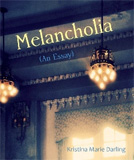January 10, 2013MELANCHOLIA (AN ESSAY)
Review by Anne Champion
Ravenna Press
2012, 54 pgs., $10.00
ISBN: 978-0-9851520-1-7
www.ravennapress.com
Years ago, I stumbled upon the work of Kristina Marie Darling because her name began to frequently pop up in various literary journals. I was always drawn to her work—not because they were poems that I wished I wrote, but because they were poems that I knew I could never have written. Darling’s collections—composed of fragments, definitions, and footnotes—embody a fearless use of white space and a devotion to unfinished narratives that reach the reader like secretive whispers only partially heard. Therefore, the reader must desperately seek to arrange a full picture on his or her own, assemble the myriad of broken puzzle pieces into a disjointed portrait. I would have never written these poems because I am too unsettled by the cracks in things; I’m always trying to tenderly create a whole landscape in my work, and large amounts of white space give me more fear and anxiety than they do pleasure. In short, I’m not brave enough to take the risks that Darling takes, and this courage is precisely what makes reading her work so dizzying and dazzling.
Melancholia (An Essay) follows Darling’s signature style to explore love and grief—those universal subjects that Darling’s poetry reveals as two sides of the same coin. The book is pocket sized: when I first picked it up, I was reminded of my copy of Pablo Neruda’s Twenty Love Poems and A Song of Despair, a surreal and sensual collection that has been a staple go-to for me, as it ravishes me with its nuances about intimacy. I pulled Neruda off my shelf and compared it to Darling—they are, indeed, the exact same size. Their smallness, for some reason, makes them feel like treasures to me.
But the similarities don’t end in their size: their subject matter also parallels. Neruda explores youthful passion and desolating loss, and Darling similarly follows suit. Where Neruda used the natural world as his metaphor, Darling’s landscapes caress the world of trinkets, charms, spinning ballerinas in a jewelry box, and birds—but both use their subject matter similarly to reflect the same jarring and terrifying message: perhaps real love must ruin us completely before it can ever bring us our salvation.
And it is this notion of irreparable wreckage that Darling interrogates forcefully in Melancholia (An Essay). The collection begins with a love letter:
Dearest—
you were like bits of broken glass
when the jewelry box shattered
night & the ocean’s coldest shore
This poem sets the entire stage for what’s to come: the direct address to the beloved, not as dear, but as the most dear, directly juxtaposed with an image that literally cuts and stings while it sparkles and glimmers its lost potential. The lack of capitalization for ‘you’ immediately evokes a sense of falling from grandeur into the ordinary, and the lack of punctuation makes the sentiments feel unfinished to me: perhaps the letter could go on, perhaps the pain implicit in it won’t ever end. Also, the indentation of the lines creates a push and pull immediately, a tension that reveals the speaker as torn in many directions against her will.
As I read further in the collection, I was most struck by Darling’s vivid images—both tender and violent at the same time. In “noctuary, definition (verb),” Darling writes:
3. To depict the beloved and discover cracks in his perfectly white teeth.
6. To examine a familiar painting—to imagine a blank canvas in its place.
In a later poem told in lyric fragments, titled “NOCTUARY II,” she writes: “Now the machine as luminous. A benevolent guillotine.”
These images send chills down my spine. Here the speaker seeks erasure—either of her beloved or of herself. In pondering the memories of love, she searches for imperfection within the warmness of a smile; she aches for blankness to what her memory has deemed as an awe inspiring piece of art. As this does not happen, the speaker suggests the love is her own demise—a violent image that is conveyed as merciful. Anyone who has suffered disillusionment in love can relate to the sentiments illustrated by these images.
Darling is also a master at using repetition as a poetic device. Midway through the book appears “A History of the Jewelry Box: A Glossary of Terms.” Each term listed is a motif that appears regularly throughout the book: bird, charm, clasp, dancer, field, and locket. Here, she defines the locket:
locket. Characterized by a hidden compartment, most often containing photographs of the beloved. Upon opening the glittering charm, she realized that its frame had always been empty.
This search and subsequent emptiness reveals the speaker’s sense of utter isolation and despair. She can’t figure out what to treasure now that her lover is gone, and the use of repetition of these items throughout the book powerfully conveys the obsession that accompanies love and heartbreak. The frequent revisits to small charms and trinkets shows the reader two things: how little we have left to hold onto once everything we have loved is gone and how insidiously grief morphs into madness. Here, Darling captures that sentiment well: “mourning. Described as a year of pathological grief, in which her locket gave rise to a luminous and deathly narcissism.”
In Melancholia (An Essay), the subject matter is not simply love and loss—it’s life and death. It’s a love of total abandon and utter devastation. Because of the power of her messages, I will continue to read the work of Kristina Marie Darling (who writes prolifically and has published many collections). Darling is captivating in the creation of her own formal constraints, and she moves within them so deftly that reading her work is a fulfilling experience: her poetry requires the imagination of the reader to work alongside it, fulgurating manically at every sparse verse.